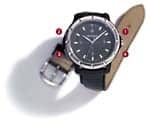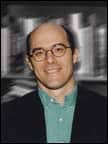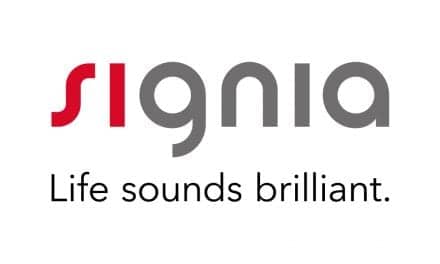Pending legislation on the provision of hearing health care and educational opportunities for practitioners took center stage at the 49th annual International Hearing Society (IHS) Convention held at the Disneyland Hotel in September. The Society’s convention drew approximately 700 hearing care professionals, including hearing instrument specialists, audiologists and audioprosthologists, and its convention floor offered more than 60 exhibits featuring the latest available hearing instruments, testing equipment and hearing-related products and services. This year’s event was considerably more upbeat compared to the conventions of the past few years, with both a rise in convention attendance and a sense of renewed enthusiasm permeating the exhibit hall and meeting rooms.
Additionally, a special Technology Luncheon focused on disposable hearing instruments and included Songbird President Fred Fritz and a panel of dispensing professionals composed of Knox Brooks, Joel Mynders, Patricia Connelly and Connie Wenke-Mercola (moderator).
Open Access
 Under current regulations, a potential hearing instrument purchaser must have a medical examination or, if over age 18, sign a waiver that discloses this requirement prior to being fit with a hearing aid. The FDA has considered the elimination of this medical waiver in exchange for the “Red Flag” screening system for use by all hearing care professionals to alert patients and physicians to serious medical conditions, as well as a “bifurcated dispensing protocol” (see Dec. ‘99 HR, p. 41). It was announced at the convention that the FDA is now leaning heavily toward a system that essentially turns the regulations over to the states to decide dispensing criteria. Several audiology groups have advocated the use of a “comprehensive audiological evaluation” which could only be performed by an audiologist. IHS believes that, should such a system become adopted on a state or federal level, it would confer “gatekeeper” status to audiologists, driving many non-audiologists out of business. Under current regulations, a potential hearing instrument purchaser must have a medical examination or, if over age 18, sign a waiver that discloses this requirement prior to being fit with a hearing aid. The FDA has considered the elimination of this medical waiver in exchange for the “Red Flag” screening system for use by all hearing care professionals to alert patients and physicians to serious medical conditions, as well as a “bifurcated dispensing protocol” (see Dec. ‘99 HR, p. 41). It was announced at the convention that the FDA is now leaning heavily toward a system that essentially turns the regulations over to the states to decide dispensing criteria. Several audiology groups have advocated the use of a “comprehensive audiological evaluation” which could only be performed by an audiologist. IHS believes that, should such a system become adopted on a state or federal level, it would confer “gatekeeper” status to audiologists, driving many non-audiologists out of business. |
 Over the course of the year, IHS and the American Academy of Otolaryngology-Head and Neck Surgery (AAO-HNS) have attended joint meetings with the Agency and written letters to members of Congress advocating continued open access to hearing care via all three professions. They contend that conferring gatekeeper status to audiologists would reduce consumer access to hearing health care, increase consumer costs and force many dispensing professionals out of the field—further reducing the use of hearing instruments which are already underutilized. IHS Legislative Counsel Tim Waters of the Washington D.C. law-firm McDermott, Will & Emory cited the FDA’s 1977 ruling that any proposed regulation should not put up barriers to consumers’ access to hearing instruments. At that time, hearing instrument dispensers were the predominant providers of hearing health care, and the FDA determined “that mandatory audiological evaluations would increase costs without providing conclusive assurance of better quality care.” Over the course of the year, IHS and the American Academy of Otolaryngology-Head and Neck Surgery (AAO-HNS) have attended joint meetings with the Agency and written letters to members of Congress advocating continued open access to hearing care via all three professions. They contend that conferring gatekeeper status to audiologists would reduce consumer access to hearing health care, increase consumer costs and force many dispensing professionals out of the field—further reducing the use of hearing instruments which are already underutilized. IHS Legislative Counsel Tim Waters of the Washington D.C. law-firm McDermott, Will & Emory cited the FDA’s 1977 ruling that any proposed regulation should not put up barriers to consumers’ access to hearing instruments. At that time, hearing instrument dispensers were the predominant providers of hearing health care, and the FDA determined “that mandatory audiological evaluations would increase costs without providing conclusive assurance of better quality care.”
Waters stated that the hearing health care field has one of the lowest levels of consumer complaints for comparable devices, and if the FDA turns regulation over to individual states, the result could be 50 different regulations with little consistency and a potential to confuse consumers. IHS leaders urged members to write their representatives in Congress, Secretary of Health and Human Services Donna Shalala and FDA Commissioner Jane Henney about the importance of maintaining open access. In more positive news, IHS successfully lobbied this year to have the job description “hearing instrument specialist” added to the government’s job classification system under the heading “Health Care Practitioners and Technical Occupations.” |
Educational Initiatives |
|
| Two initiatives in the area of professional education were unveiled at the convention. A two-year associate’s degree has been established at Spokane Falls Community College (SFCC) in Spokane, WA. The key to the program is its distance-learning component. Diane Bernath, BC-HIS, detailed the new program, which started in September with 20 full-time students. She says the SFCC facility is equipped with five sound booths, state-of-the-art testing and fitting equipment and a lab dispensary.
The distance learning program includes video programs and interactive workshops for students. Plans are being made to translate the cirriculum into several languages. “This program is for everyone interested in providing quality hearing care,” says Bernath. “If someone wants to get into the field, this is it. We all know you can’t learn about dispensing hearing instruments just in a classroom. This program addresses the unique real-life needs of caring for patients.” The anticipated cost of the degree program for students is approximately $3000 for state residents and $4000 for distance learners (however, these costs may be further reduced once accommodations for previous education credits for ACA or BC-HIS certification and/or professional experience are determined for the individual dispensing professional). The NBC-HIS exam has also been expanded to accommodate for the increasing numbers of certification candidates. Additionally, former IHS President Jon Durkin, BC-HIS, detailed the organization’s International Role Study which he says will enable the hearing health care industry to help define current and future trends for hearing care needs on a global basis. |
|
Appointments and Awards |
|
 President Scott Austin is presented with the Society’s gavel by outgoing President Harvey. |
Outgoing President Kathy Harvey, MA, handed the Society’s leadership gavel to incoming President Scott Austin of Portland, OR. Austin says that he will continue the Society’s support for open access to hearing health care, strongly oppose any gatekeeper status from other professions, support the Better Hearing Institute’s (BHI) new initiatives for physician outreach and education, and continue IHS educational goals on a worldwide basis for the purpose of quality hearing care for all people. |
 W. F. Samuel Hopmeier was voted new president-elect of IHS. |
W.F. “Sam” Hopmeier, BC-HIS, MBA, of St. Louis was named new president-elect of the Society. Hopmeier, who received his undergraduate degree at Washington Univ. and his MBA from Harvard, is a second-generation hearing instrument specialist and has been involved in hearing health care since 1966. Hopmeier was the 1999 HR Professional Leadership Award recipient. |
 Ayres D’Costa, PhD, was presented the Joel S. Wernick Excellence in Education Award from Jerry Laux of the Hearing Journal. |
The Hearing Review’s 2000 Professional Leadership Award was presented to outgoing President Kathy Harvey, MA, BC-HIS. Harvey, the first audiologist to serve as president of IHS, presided over a time of significant educational gains and difficult but fruitful legislative activities. Ayres D’Costa was presented with The Hearing Journal’s Joel S. Wernick Excellence in Education Award. D’Costa, a professor at Ohio State and psychometrician, has provided crucial statistical information for the Society, including crucial data on marketing and role delineation studies for educational programs and certification exams. |
IHS Goes to Chicago in 2001
IHS celebrates its Golden Anniversary Convention with its 50th annual conference being held in Chicago at the Hyatt Regency on the Riverwalk. For more information, contact: IHS, 16880 Middlebelt Road, St. 4, Livonia, MI 48154; tel: (734) 522-7200; website: www.hearingihs.org.





